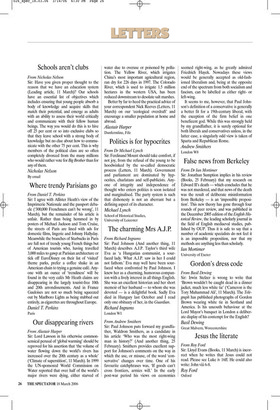The charming Mrs A.J.P.
From Richard Ingrams
Sir: Paul Johnson (And another thing, 11 March) describes A.J.P. Taylor’s third wife Eva as ‘a Hungarian communist, a sourfaced lady. What A.J.P. saw in her I could not fathom.’ Eva may well have been sourfaced when confronted by Paul Johnson. I knew her as a charming, humorous companion with a lively interest in all things English. She was an excellent historian and her short memoir of her husband — to whom she was devoted — is a delightful book. Sadly Eva died in Hungary last October and I read only one obituary of her, in the Guardian.
Richard Ingrams London W1
From Andrew Smithers
Sir: Paul Johnson puts forward my grandfather, Waldron Smithers, as a candidate in his article ‘Who was the most right-wing man in history?’ (And another thing, 25 February). Smithers provides excellent support for Johnson’s comments on the way in which the use, or misuse, of the word ‘conservative’ changes over time. One of his favourite catchphrases was, ‘If goods can’t cross frontiers, armies will.’ In the early post-war period his views on economics seemed right-wing, as he greatly admired Friedrich Hayek. Nowadays these views would be generally accepted as old-fashioned liberalism and, being at the opposite end of the spectrum from both socialism and fascism, can be labelled as either rightor left-wing.
It seems to me, however, that Paul Johnson’s definition of a conservative is generally a better fit for a 19th-century liberal, with the exception of the firm belief in one beneficent god. While this was strongly held by my grandfather, it is surely optional for both liberals and conservatives unless, in the latter case, a singularly odd view is taken of Sparta and Republican Rome.
Andrew Smithers London W8


















































































 Previous page
Previous page